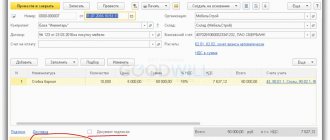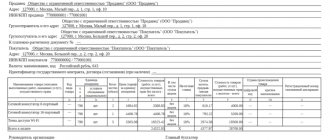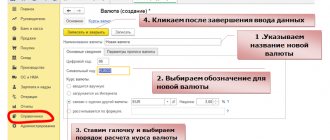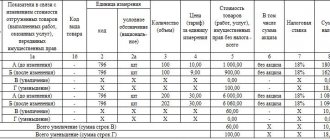Who signs the invoice?
The issue of who signs invoices should be resolved by the seller in a timely manner.
If this function in the company is not assigned to anyone, the buyer may suffer: an unsigned invoice leaves him without a tax deduction. The same result awaits the buyer if the invoice received from the seller contains the signatures of unauthorized persons. The Tax Code does not strictly establish who signs invoices, and does not prohibit invoices from being signed by other persons in the company (managers, financial specialists, etc.). But the names and positions of the employees authorized to sign invoices must be reflected in the order - then the question of who signs invoices in this company will be resolved.
An invoice can be signed not only by authorized representatives of an organization or individual entrepreneur, but also by a specialist accountant or employees of another company. Typically, this occurs when bookkeeping, including signing invoices, is delegated to these individuals under an accounting services contract. In order for a specialist accountant or employees of an accounting company working under a contract to sign invoices, it is also necessary to either issue a power of attorney for them, or draw up a separate annex to the contract indicating the persons whom the parties authorize to sign the invoices.
ConsultantPlus experts explained by whom and how an electronic invoice is issued and signed. Study the material by getting trial demo access to the K+ system.
Let’s take a closer look at how to properly issue a power of attorney to sign invoices.
Source documents
Invoices, acts, invoices, payments, cash orders and other primary documents constitute the main document flow of the accounting department. Very often they are drawn up in different departments of the company, so it is quite logical that they are signed by different persons. However, the right to sign documents must be assigned to these persons.
The procedure for signing primary documents is regulated by two regulations:
- Federal Law No. 402-FZ “On Accounting” dated December 6, 2015;
- Regulations on accounting and financial reporting in the Russian Federation, approved by Order of the Ministry of Finance dated July 29, 1998 No. 34n.
The mentioned norms require that the head of the organization, in agreement with the chief accountant, approve a list of persons who have the right to sign certain documents. Thus, in order to give an employee the authority to sign the primary accounting document, the director only needs to issue the appropriate order or instruction. This also applies to settlement and monetary documents.
Note! The position of the person authorized to sign must correspond to the position indicated in the primary document. In other words, if, for example, the invoice form requires the signature of the chief accountant, another employee does not have the right to sign this document, even if it is included in the corresponding order of the manager. Therefore, experts recommend that companies independently develop forms of primary documents and indicate, for example, “Manager or other authorized person” in the details of the signatory.
How to draw up a power of attorney to sign invoices: sample
Any employee of the company cannot sign invoices, because in clause 6 of Art. 169 of the Tax Code of the Russian Federation states that this document must contain the signatures of the manager and chief accountant or other authorized persons. As for the individual entrepreneur, he must sign the invoice himself or entrust this work to a trusted person.
In large companies with a complex management structure, the manager may delegate some of the authority to his deputies, full-time employees, or even third parties.
In companies with little document flow, the invoice is signed, as a rule, by the director and chief accountant; an individual entrepreneur often has to fulfill this responsibility alone. But if he decides to save himself from this work, he will need to be given the right to sign invoices by documenting the authority through a power of attorney certified by a notary (letter of the Ministry of Finance of Russia dated April 25, 2017 No. 03-02-08/24718). In this case, the invoice will contain the details of two documents at once - the issued power of attorney and the certificate of state registration. IP registration.
Power of attorney forms do not relate to strictly normative documents, and therefore are not defined by law. But you can draw up a sample power of attorney yourself, focusing on standard forms and thereby determining who signs invoices in the absence of management.
A power of attorney for signing invoices, a sample of which you can view on our website.
On company letterhead
POWER OF ATTORNEY No. _______
mountains ____________________ "___"____________ ___ G.
_______________________________________________________________________
(Company name)
represented by _________________________________, acting on the basis of ____________,
(Full name of the manager, his position)
hereby authorizes _____________________________________________________
(F.I.O. and position held)
passport: series and number ________ issued by ___ ___ ______ by _________________________,
registered at: ______________________
sign invoices for the director (chief accountant).
The power of attorney was issued for a period of ______________ without the right of substitution.
Signature ______________________________ ___________________________ I certify.
(full name of the authorized representative) (signature of the authorized representative)
_______________________________ _________________ _______________
(manager position) (signature) (full name)
M.P.
You can download the finished sample:
Tax returns
The rules for signing tax returns and calculations are established in Article 80 of the Tax Code. They state that these documents must be signed by the taxpayer or his representative. A taxpayer is understood to be the head of a company or an individual entrepreneur, that is, a person who can act without a power of attorney. The signature of this person must be affixed to the declaration or calculation. If the document is signed by, say, the chief accountant, then it is necessary to give him such powers through a power of attorney.
Note! The tax authorities must be notified of the transfer of these powers. Before submitting a report signed by an authorized person to the Federal Tax Service, you must send there a copy of the power of attorney. In addition, its details must be entered in the appropriate field of the declaration, and a copy of the power of attorney must be attached to it.
VAT reporting
As you know, since last year all companies have been reporting VAT electronically. An exception is tax agents who are not VAT payers. The electronic declaration is signed by UKEP and transmitted via telecommunications channels (TCC) using an electronic document management operator (EDO).
How can you delegate the authority to sign a VAT return to another person? In general, everything is the same - you need to draw up a power of attorney and notify the tax authority about the transfer of powers. The only difference is that this can be done electronically, and an information message about the power of attorney must be attached to the declaration each time. This procedure applies to any tax report (calculation) submitted through TCS channels.
Transfer of authority to other persons, sample order for the right to sign invoices
Let's look at an example. The director of Green World LLC, R. A. Patrikeev, often goes on business trips abroad due to official needs. The company's chief accountant is responsible for overseeing accounting in regional divisions, so she is also often away. As a result, the question arose: who signs invoices in their absence?
To resolve the issue, the company issued an order “On granting the right to sign invoices” dated September 21, 2017 No. 167, after which the question “Who signs invoices?” didn't get up again. Thus, the company complied with the requirements of the law and saved itself and its customers from potential claims from controllers.
For more information about what inaccuracies are permissible in an invoice, read the material “What errors in filling out an invoice are not critical for VAT deduction?” .
IMPORTANT! Before writing an order about who has the right to sign invoices, it is better to open GOST R 6.30-2003 and familiarize yourself with the requirements for the preparation of organizational and administrative documentation.
You can view and download a sample order on our website.
New props
The name of the currency appeared in the list of required invoice details from September 2, 2010. However, the form of the document, which is given in Resolution No. 914, does not contain a column for its entry. There is a dilemma: you can’t fill it out in accordance with the requirements of the law, the tax authorities have the right to refuse a deduction, and in principle it is impossible to complete it according to all the rules. In any case, if the invoice is completed, as required by the legally established Procedure.
What should I do?
The Russian Ministry of Finance had to “screw in”, which the officials did quite successfully. In a letter dated October 12, 2010 No. 03-07-09/46, specialists from the Finance Ministry explained that until the Government of the Russian Federation establishes an invoice form that provides for the named indicator and the procedure for filling it out, the name of the currency is not required to be entered in the invoices. Indeed, according to paragraph 4 of Article 10 of Law No. 229-FZ, before the Cabinet of Ministers approves the documents specified in paragraph 8 of Article 169 of the Tax Code of the Russian Federation as amended by Law No. 229-FZ, invoices are drawn up taking into account the requirements established before the date of its entry into force, that is, until September 2, 2010. And in the current Resolution No. 914, which determines the procedure for filling out an invoice, the indicator “name of currency” is absent.
Meanwhile, entering additional information into invoices is not prohibited by the Tax Code. Therefore, experts from the Ministry of Finance added that taxpayers indicating the name of the currency in invoices after September 2, 2010 can be considered as providing additional information, which is not a basis for refusing to deduct VAT amounts on such invoices.
In order to avoid claims from the Federal Tax Service of Russia, which has not given any explanations on this problem, it still makes sense for VAT payers to independently enter the “name of currency” detail into the invoice form and fill it out.
Do I need to sign the invoice on both sides?
Given the large amount of information that needs to be reflected in this document, it may happen that one page is not enough. The Tax Code of the Russian Federation does not contain a prohibition on issuing an invoice on several sheets.
So that the recipient does not have concerns about the reliability of the data, we recommend transferring part of the tabular form to another sheet so that it looks like a continuation of the previous one. In addition, the document originator may be required to endorse each page of the invoice.
For clarity, all information is reflected on separate sheets, stapled and numbered. You can also display the data on the back, but this is inconvenient for accountants processing documents bound for archiving. Details that determine who signs invoices in the organization (“Head of the organization” and “Chief accountant”) are indicated on the last sheet. This arrangement of signatures is not a violation if the continuous numbering is not broken.
Rules for drawing up powers of attorney
Depending on who delegates its powers - an organization or an entrepreneur - the rules for drawing up a power of attorney will differ.
A power of attorney on behalf of an organization must meet the requirements of Articles 185–187 of the Civil Code of the Russian Federation. In accordance with them, the power of attorney must be executed in writing, indicating the date of issue and validity period, and signed by the director. If there is no validity period, then the power of attorney will be considered issued for one year. It can be drawn up for both a legal entity and an individual, regardless of whether he works for the trustee organization or not. Such a power of attorney does not require a sample signature of an authorized person or notarization.
If the powers are delegated by an individual entrepreneur, then the power of attorney must be notarized (Resolution of the Plenum of the Supreme Arbitration Court of the Russian Federation dated July 30, 2013 No. 57).
Results
The issue of who signs invoices must be resolved in a timely manner. If this is done by the manager (IP) or the chief accountant, no additional actions are needed, but if other persons sign, then it is necessary to consolidate their powers by issuing the corresponding local act (order, instruction) or issuing a power of attorney.
These documents will officially identify who signs the invoices, and your counterparty will not have to argue with inspectors and defend a deduction if the invoice is signed by unauthorized persons.
You can find more complete information on the topic in ConsultantPlus. Free trial access to the system for 2 days.
Mandatory details and form
Mandatory invoice details are listed in paragraphs 5, 5.1 and 6 of Article 169 of the Tax Code of the Russian Federation. Regarding its form, we note the following. According to the old version of paragraph 8 of Article 169 of the Tax Code, the Government of the Russian Federation was not authorized to determine the form of the invoice and the procedure for filling it out.
This means that the document form, which is given in Resolution No. 914, can be regarded as recommended, and not mandatory for use. Therefore, drawing up a document in a different form does not constitute a violation. This conclusion is given in the resolution of the Federal Antimonopoly Service of the Ural District dated May 24, 2005 No. F09-2174/05-S2. The main thing is that defects in the form do not entail violations of the requirements of paragraphs 5, 5.1 and 6 of Article 169 of the Tax Code of the Russian Federation. This follows from the decision of the Federal Antimonopoly Service of the Central District dated November 7, 2006 in case No. A35-7749/05-C21. In other words, they contained all the required details. However, at the moment this is not so easy to do.






